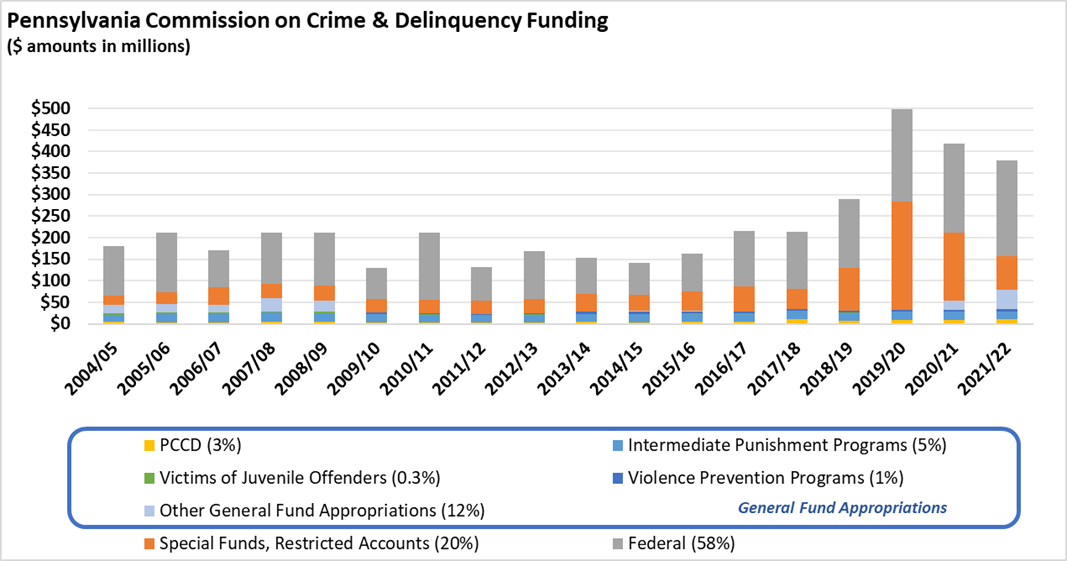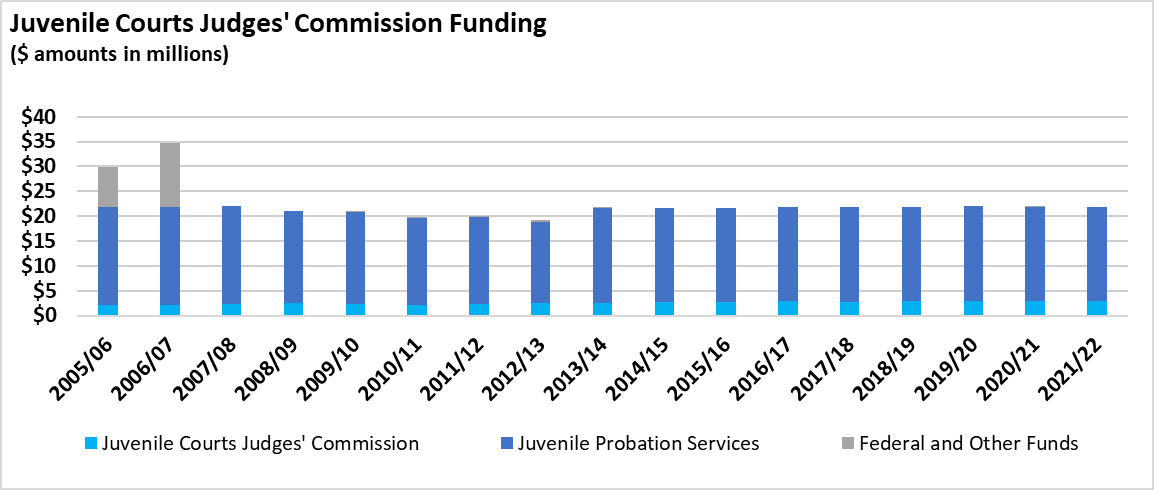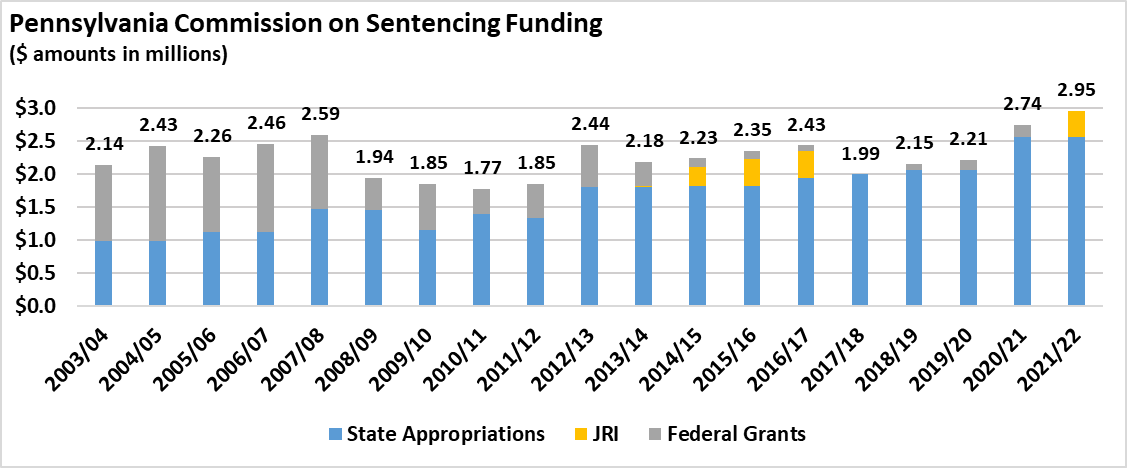Criminal Justice - Commissions
By Bradley Keen , Senior Budget Analyst | 3 years ago
Public Safety Analyst: Bradley Keen, Senior Budget Analyst
Various legislatively established commissions operate alongside criminal justice agencies and the judiciary to make up a critical support network for criminal justice professionals, the legislature, and other stakeholders. The General Assembly created the Juvenile Courts Judges’ Commission, which transformed the commonwealth’s juvenile justice system in 1959. The Pennsylvania Commission on Crime and Delinquency and the Pennsylvania Commission on Sentencing were established in 1978.
Pennsylvania Commission on Crime and Delinquency
The Pennsylvania Commission on Crime and Delinquency provides criminal justice system planning, coordination, and technical assistance. It also serves as a clearinghouse for state and federal grants to support criminal and juvenile justice. In 2021/22, the commission awarded $105 million in state and federal grant funding to counties, non-profits, and other organizations. An interactive dashboard, maintained by the commission, contains additional information on these grants.
The commission is comprised of 46 members who are required, by statute, to be:
- Two justices and two judicial appointments,
- Eleven members of the executive branch, including heads of criminal justice agencies,
- Seven gubernatorial appointments with specific qualifications,
- Six members of the General Assembly, of which four are appointed by leadership of each caucus, and
- Other gubernatorial appointments as needed.
Within the PCCD, advisory committees and training boards spearhead the commission’s work in children’s advocacy, criminal and juvenile justice, mental health, victims’ services, research, and sheriff and constable training. Commission members and other professionals serve on the advisory committees and training boards.
In 2018, Act 44 created a new School Safety and Security Committee in PCCD whose responsibilities include establishing criteria for school safety and security assessments and for administering a grant program.
The Pennsylvania Commission on Crime and Delinquency is funded by its own appropriation in the General Fund, and by General Fund appropriations for violence prevention, victims of juvenile offenders, intermediate punishment programs, and the improvement of adult probation services (moved from the Department of Criminal Justice to the Commission in December 2020 by Act 115 of 2019). Over half of PCCD’s budget comes from federal funds (58 percent in 2021/22). Special funds and restricted revenue accounts that provide for specific justice-related programs make up the balance of the commission’s budget. Altogether, the General Fund appropriations comprised about 21% of the commission’s 2021/22 budget.

The next sections provide additional detail on county intermediate punishment programs (CIP), violence intervention and prevention programs (VIP), and special funds administered by PCCD.
Intermediate Punishment Programs
These programs provide grants to counties for intermediate punishment programs that divert offenders from incarceration. The appropriation has been level funded at $18.2 million since 2013/14. Eighty percent of the funds are earmarked for programs that provide drug and alcohol or mental health treatment.
Intermediate punishment programs target individuals whose criminal justice involvement is rooted in addiction, mental illness, or other needs. These sentences can take many different forms, including partial confinement, residential treatment, electronically monitored home confinement, probation supervision coupled with treatment programs, or participation in a problem-solving court.
Two primary benefits of intermediate punishment programs are cost savings and improved offender outcomes. Drug and alcohol restrictive intermediate punishment programs (D&A RIP), a specific form of County Intermediate Punishment (CIP) programs for drug and DUI offenders, have been shown to produce lower recidivism rates compared to state prison sentences for similar offenders. A 2017 matched comparison study showed a 9.2 percent reduction in the number of people in the comparison group who were sentenced to state prison. The program’s effect of lowering recidivism rates can generate future savings and improve public safety by reducing crime.
Counties avoided approximately 478,000 days of incarceration in 2021 for participants who successfully completed CIP and D&A RIP programs – equivalent to approximately $55 million in averted costs.
Violence Intervention and Prevention Grants
Violence Intervention and Prevention (VIP) programs fund community violence reduction programs. Community Violence Prevention Grants allow organizations like YMCAs and Boys and Girls Clubs, as well as municipalities and businesses to address the gun and school violence epidemics happening in neighborhoods across the commonwealth. In 2020/21, $30 million was appropriated for these programs. Funding for this program was previously transferred from the Judicial Computer System Augmentation Account.
Special Funds and Restricted Accounts
A number of statute-mandated fees and surcharges relating to criminal convictions and court processing are deposited into special funds or restricted accounts of the General Fund for a specified use. PCCD administers these funds. The largest five fees, described below, support victims of crime, train constables and sheriffs, and provide for substance abuse education and prevention initiatives:
- The Victim Witness Services and Crime Victim’s Compensation funds provide for victim compensation, and victim and witness services. Fees levied on individuals convicted of a crime are deposited into these funds.
- The Sheriff and Deputy Sheriff’s Education and Training Account reimburses counties for the full cost of training sheriffs. Surcharges for legal services provided by sheriffs are deposited into this account.
- The Constable’s Education and Training Account provides for training and continuing education of constables. A fee on each criminal and civil case before a magisterial district justice is deposited into this account.
- The Substance Abuse Education and Demand Reduction Fund provides county and grant funding for research-based approaches to prevention, and for youth and workforce education and prevention programs. Ten percent of the fund is directed to the attorney general’s Community Drug Abuse Prevention Grant Program. Fees levied on individuals convicted of drug and DUI offenses are deposited into this fund.
- The School Safety and Security Fund provides for grants to school entities for school safety and security and grants to municipalities, institutions of higher education, and community organizations for community violence prevention programs.
Following the passage of the first round of Justice Reinvestment Initiative bills in 2012, PCCD received 70 percent of the formula-based distributions from the Justice Reinvestment Fund, which was about $9.5 million from 2013/14 to 2016/17. A portion of the Department of Corrections’ savings generated by JRI were appropriated annually into this fund during the 5-year initiative beginning in 2012 (the 2017/18 Fiscal Code waived the transfer for the final year of the initiative). Appropriations to PCCD from the Justice Reinvestment Fund provided for victim services, innovative policing, and county probation.
In 2019, two bills from the second round of the Justice Reinvestment Initiative were passed (Act 114 and Act 115 of 2019). Starting in 2021/22, a percentage of the savings realized by the Department of Corrections through the implementation of short sentence parole, increased use of State drug treatment programs, and the use of sanctions for technical parole violations will be deposited into the Justice Reinvestment Fund. These funds will be distributed by the PCCD for the purpose of crime victim’s compensation, to implement risk assessment and justice reinvestment sentencing features, and for county probation and parole grants.
Children’s Advocacy Centers
Children’s advocacy centers (CACs) throughout Pennsylvania provide treatment and support the investigation of suspected child sexual abuse cases. PCCD distributes state and federal funding to support the centers. The CAC Advisory Committee, established by Act 28 of 2014, facilitates this process.
In its first two years, the DARE license plate account (under Act 27 of 2014) and an appropriation from the General Fund designated in the Fiscal Code of 2014/15 financed child advocacy centers. Since 2015/16, child advocacy centers have been funded by a portion of birth certificate fees collected by the Department of Health (authorized by Act 28 of 2014), and by the Monetary Penalty Endowments Trust Fund (known as the Endowment Fund or the Penn State Settlement) created under Act 1 of 2013; both are managed by PCCD.
The commission maintains an interactive report of annual grant awards for CACs from the endowment fund. Eleven two-year grants totaling $1.03 million were awarded in 2020.
Juvenile Court Judges’ Commission
The Juvenile Court Judges’ Commission advises juvenile courts, establishes, and monitors standards, and provides training and grant funding for juvenile probation services. The JCJC, which is made up of nine judges who are nominated by the chief justice of the Pennsylvania Supreme Court and appointed by the governor, aims to promote the appropriate care of delinquent and dependent children, employ evidence-based practices, and maintain statistical data for the juvenile court system.
Individual county courts and county juvenile probation offices comprise the juvenile court system. Juvenile courts are part of the Court of Common Pleas. Depending on the county, these courts can be a separate division of the common pleas court overseen by a designated judge, or merely specified days or times when juvenile cases are scheduled before judges who also hear adult cases. Juvenile probation offices are led by a chief juvenile probation officer who is appointed by the court.
A Brief History of Juvenille Courtsand the JCJC1
A Brief History of Juvenile Courts and the JCJC[1]
1826 Children over 14 (in some cases as young as 8) are charged as adults. Philadelphia begins housing children separately from adults.
1901 The Juvenile Court Act establishes a separate court for juveniles (challenged and enacted again as amended in 1903). Juvenile court jurisdiction covers only minor crimes.
1933 Expands juvenile court jurisdiction to all crimes except murder.
1939 Increases juvenile age from 16 to 18.
1959 The Juvenile Courts Judges’ Commission is established to provide guidance to juvenile courts.
1972 The Juvenile Act, amended throughout the 1970s and 1980s, codifies juvenile rights.
1995 Act 33 of the special session on crime fundamentally changes the juvenile court system to focus on rehabilitation and effective care of children who commit delinquent acts.
2005 Pennsylvania is selected as the first state to participate in the MacArthur Foundation’s “Models for Change Initiative.”
In 2021, 6,315 juveniles successfully completed supervision in the juvenile court system – which is supported by the Juvenile Courts Judges’ Commission – without committing a new offense (88.1 percent success rate).
The JCJC is funded by a General Fund appropriation. The commission administers a grant program to improve juvenile probation services, which is also appropriated from the General Fund.

The Pennsylvania Commission on Sentencing is charged with developing and maintaining fair and uniform sentencing guidelines. The General Assembly created the commission in 1978 and it has been housed at Penn State University since 1981. The commission provides research and consulting capacity to the courts and the legislature in matters relating to sentencing and parole. Its sentencing policy specialists provide technical assistance to judges, prosecutors, public defenders, and others.
Members of the commission are appointed by the leaders of the three branches of government. They include a majority and minority member of each legislative chamber, four judicial appointments, a district attorney, a defense attorney, and a professor. In addition, the DOC secretary, Board of Probation and Parole chair, and the state’s victim advocate sit on the commission as ex-officio members. The members are not paid a salary for their commission work. The commission is also staffed by about two dozen employees.
Updates to the sentencing guidelines to accommodate changes – such as sentencing enhancements – have become more frequent in recent years. In 2021, the legislature enacted two laws that created new offenses (Acts 48 and 49 of 2021) and two laws with sentencing enhancements (Acts 53 and 71 of 2021). The Commission on Sentencing incorporates these changes into the sentencing guidelines and provides training to judges and other criminal justice professionals.

The Pennsylvania Commission on Sentencing is funded with a General Fund appropriation, state Justice Reinvestment (JRI) funds (2013/14, 2014/15, 2015/16, 2016/17, and 2021/22), and federal grants.

On average over the past 18 years, 25 percent of funding for the commission has come from federal grants. However, federal funding to PCS has decreased from $1.2 million (54 percent) of the commission’s budget in 2003/04, to just $188,681 (7 percent) of the commission’s budget in 2020/21. The PCS does not anticipate any federal funding in 2021/22.
This shift reflects a decrease in the amount of available grant money, a misalignment between the priorities of the Commission and the grants that are available, and a desire to become less reliant on grant-funding to support basic operations, statutory mandates, and mission-critical applications. In recent years, the Commission has sought funding to rebuild their web application (SGS Web) and to address mandated projects. As an alternative to federal funding, they have pursued funding as part of the Justice Reinvestment Initiative (JRI-I and JRI-II). The Commission has also obtained a grant through the Bloomberg Philanthropic (Vital Strategies) to underwrite a research project on substance-related probation violations and is currently seeking a direct federal grant to support research on race/ethnicity.